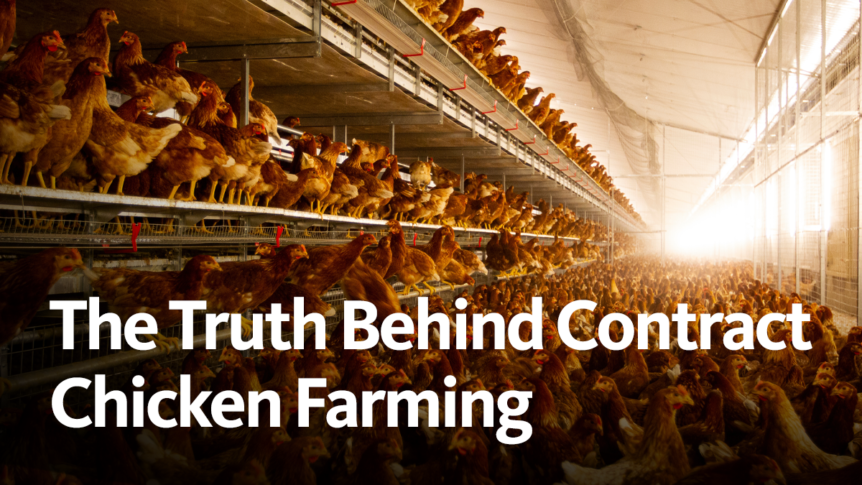As the price of chicken continues to rise, consumers spend more, and corporate profits soar, chicken farmers themselves are not reaping any financial benefits. According to The National Chicken Council, the amount farmers are paid per pound of chicken has consistently decreased since 1990.
The “broiler” chicken industry is highly consolidated. Tyson, JBS (Pilgrims Pride), Perdue, and Sanderson Farms make up more than half of the U.S. chicken market. The chicken industry relies on a contract farming model where companies like Tyson and Perdue essentially own the chickens and chicken feed. Independent farmers need to borrow a large sum of money from the company to help with the cost of feed and housing.
The National Chicken Council claims that this kind of contract farming benefits farmers because the company they partner with absorbs the risks and farms won’t have to sell at a loss. But chicken farmers are speaking out against contract farming.
Craig Watts is a former chicken farmer who revealed how the contract system was a disaster for his farm. The company that oversaw his chickens would rate his performance against all of the other farmers nearby. The company based its evaluation on the weights of the birds and how much grain the chickens ate. Watts was frustrated with the system because he had no control over the types of feed or health of the chickens he received.
In 2015, Charles Morris and several other farmers brought a lawsuit against Tyson, Perdue, Koch Foods, and Sanderson Farms. The suit claimed predatory, anti-competitive, unfair, and bad faith conduct in the domestic market for broiler-raising services. The farmers alleged that the poultry companies agreed to share data on grower compensation with one another, with the purpose of stabilizing grower compensation below competitive levels. Tyson and Perdue recently agreed to pay nearly $35 million in the settlement without admitting any wrongdoing. The lawsuit remains pending against Pilgrim’s Pride, Koch Foods, and Sanderson Farms.
In 2017, a documentary came out called Under Contract. It documents the struggles of eight chicken farmers in West Virginia, Mississippi, and other states in the rural Southeast. According to the documentary, farmers who complained to companies who owned their chickens were punished with delayed shipments, delivery of sickly chickens, and possibly cancellation of their contract. These punishments led to bankruptcy and loss of farms for some of the farmers featured in the film.
It seems there are two contrasting stories being told about chicken farming. One story is by the National Chicken Council and companies like Tyson and Perdue: “Contract farming is an excellent supplemental income for farmers, helping farmers diversify their business while bringing in a modest income, which in turn keep tens of thousands of families on small farms who otherwise would have had to get out of agriculture altogether.” The second story is from chicken farmers themselves, who report frustration and exploitation. Companies like Tyson pit farmers against each other using divide and conquer tactics. Farmers who do very well end up receiving more pay at the expense of the other half of farmers who receive depressed wages. Depressing farmers’ paychecks in this manner puts rural communities in an unstable and inequitable situation. These companies rely heavily on exploitation to increase efficiency and maximize profit.
Documentaries and interviews with contract farmers continue to shine a light on the exploitation of farmers, disease outbreaks, and abysmal animal living standards. The acts of these large companies show that they will exploit people and animals to turn a profit. The contract farming system relies on taking advantage of farmers. An option available to farmers is to transition their farm from animal-based farming to plant-based farming.
Animal Outlook’s Farm Transition program supports farmers by offering expert technical support, hands-on agricultural consulting, pro-bono legal assistance, farm business planning and enterprise budgeting, market development and analysis, infrastructure adaptations and conversions, training, and other resources needed for transition. An additional resource is the Farmer Toolkit, which is a resource hub for farmers who are interested in learning how to transition into a more profitable and sustainable system.
There is now an increase in demand and availability of chicken alternatives, as well as plant-based alternatives. Farmers now have the opportunity to play a large part in changing our food industry for the betterment of consumers, animals, and the planet.



Comments 5
Let’s help humane animal care.
Be the voice for all animals. Let’s help humane animal care.
Yes indeed!
keep all animals safe
keep all animals